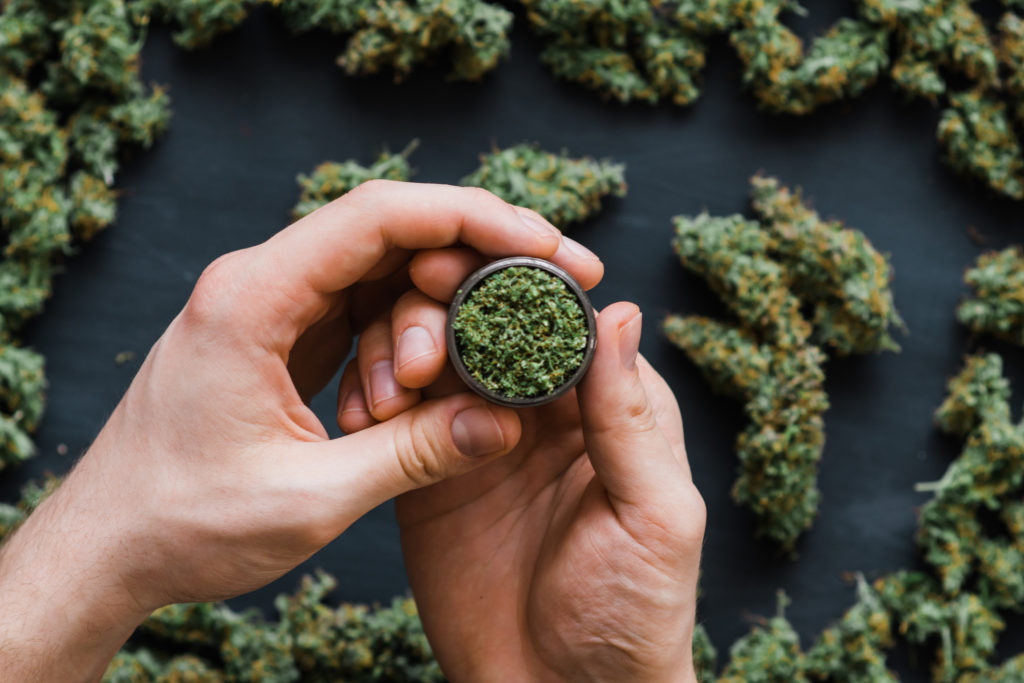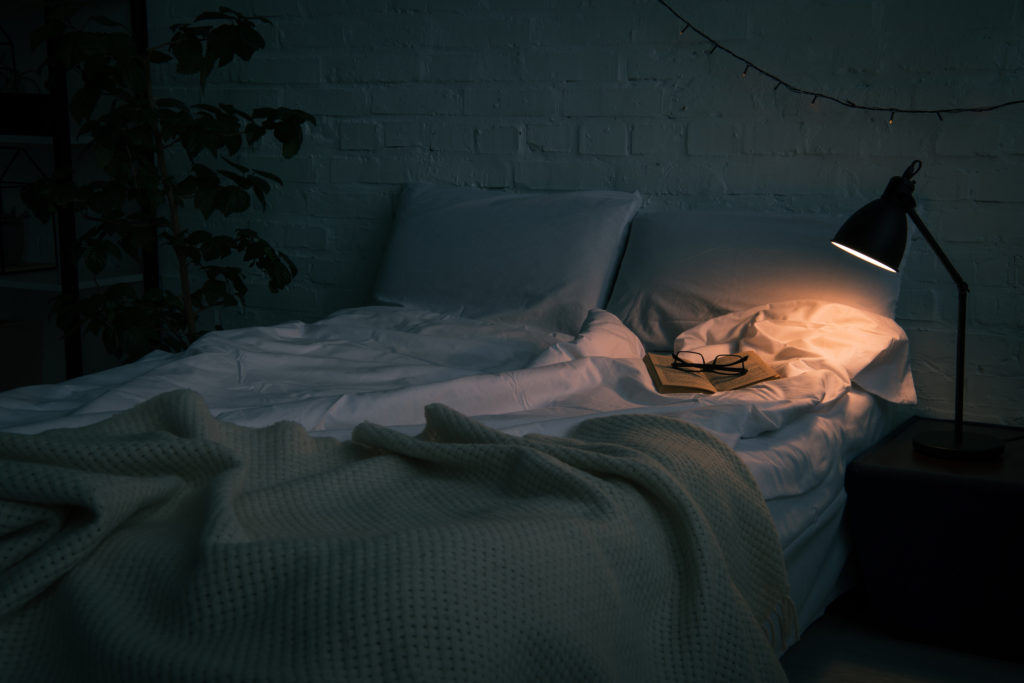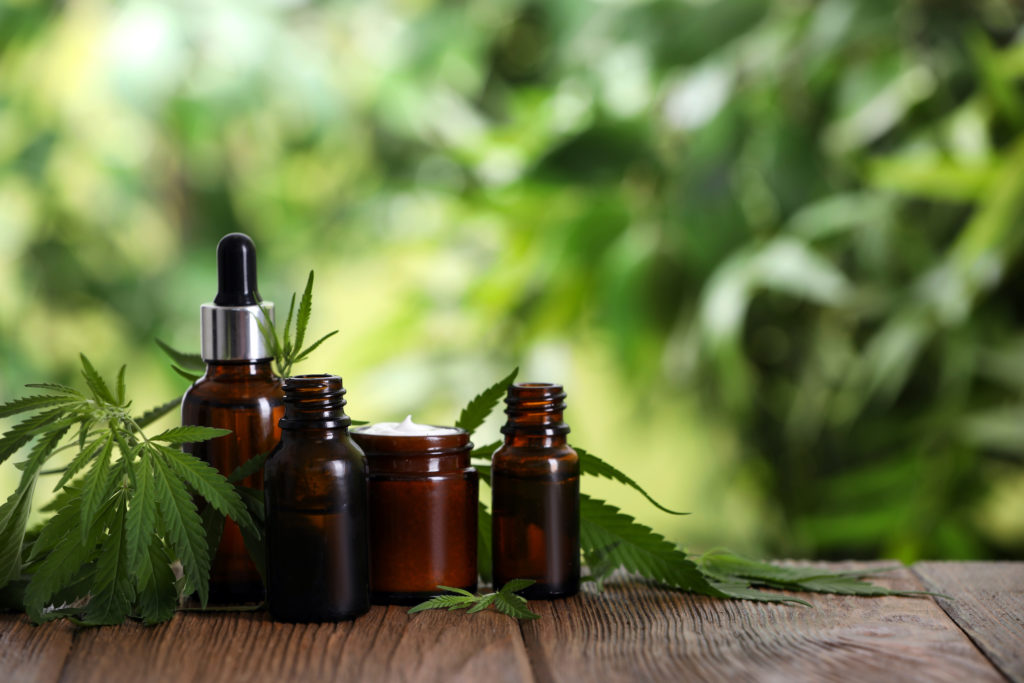
For decades now, experts and everyday folk alike have recognized cannabis as an effective way to catch a few more winks. Some strains are particularly revered for the hypnotizing, “couch-lock” effects they produce.
While many take CBD before bed, studies show THC has sleep-promoting effects in its own right, too.
So, what does the science say? Can a bit of THC and CBD coddle you into a deep, restorative slumber?
Using THC Before Bed
Once you’re all cozy in your PJs, there are several different ways you can use THC before hitting the hay. This includes taking a tincture or edible from a dispensary, vaporizing cannabis, or dabbing cannabis concentrates.
However, it’s important to note how you take THC before bed affects how long it takes to kick in. If you’re taking a tincture or THC gummies for sleep, it can take 30 to 90 minutes to feel the effects.
Vaporizing or dabbing cannabis is a much faster option for using THC before bed. When you inhale cannabis, you feel the effects almost instantly.
So if you’re in a pinch and need to fall asleep fast, vaping or dabbing cannabis is the quickest route of administration. Otherwise, make sure to take your tincture, gummy, or edible at least 30 minutes before going to bed.
What Happens When You Go to Sleep “High”?
One of the most jarring effects of going to sleep after using cannabis is the lack of dreams you’ll have. For those who suffer from recurring nightmares, this might sound like a blessing in disguise.
See, there are two different types of sleep — non-rapid eye movement (NREM) and rapid eye movement sleep (REM). Dreaming is primarily associated with rapid eye movement sleep, which is the fifth and final stage of the sleep cycle. Your body repeats these cycles every 90 minutes while you’re sleeping.
Physicians and researchers can tell what stage of sleep you’re in by using an electroencephalogram (EEG). This is a device that uses electrodes placed around your scalp to measure the electrical activity of your brain. The EEG records the electrical activity as brain waves.
The five stages of sleep are defined below, followed by an explanation of how cannabis affects your sleep cycle.
- NREM-1: As you unwind under your fluffy comforter, your body relaxes and enters the first stage of sleep. Arousal is still very easy during this stage, though your body is progressively gearing up to enter NREM-2.
- NREM-2: This is the stage in which “sleep spindles” start to appear on an EEG. Arousal becomes more difficult during this period, though you haven’t reached the deepest stage of sleep just yet.
- NREM-3: At this point, you’ve begun entering a deep stage of sleep. Your breathing and heart rate are slowed down during this stage. Theta and delta brain waves begin to appear on an EEG.
- NREM-4: Arousal is most difficult during this sleep stage. Bedwetting, nightmares, night terrors, and sleepwalking may also occur during NREM-4. Delta waves start to dominate the EEG reading.
- REM: This is where the magic happens in terms of dreaming. Your muscles are completely inhibited at this point to prevent you from acting out your dreams. Remarkedly, more oxygen is used during REM sleep than when you’re consciously awake. REM sleep is signified on an EEG by the reappearance of alpha brain waves.
THC decreases sleep latency and waking in the middle of the night. Sleep latency is the amount of time it takes you to fall asleep. Furthermore, THC increases slow-wave sleep and decreases the amount of time spent in REM sleep.
This decrease in REM sleep means your body is spending less time dreaming and more time in other stages of sleep. The REM stage doesn’t disappear altogether with cannabis, but it’s significantly shorter after using THC.
Τhus, those who tend to smoke cannabis or take an edible before bed also tend to dream less often.
However, those who use cannabis frequently may develop a tolerance to THC. This occurs as your body gets used to elevated amounts of THC in your system. As your body gets used to cannabis, you start to need more than before to achieve the same effects.
Nevertheless, this tolerance to THC isn’t permanent. If you take a break from using cannabis, you can “reset” your tolerance, so to speak. Throughout the cannabis community, this is lovingly referred to as “taking a T break.”
Suppose you’d like to reset your tolerance. In that case, most experts recommend taking at least a three-week T break, as it takes about 21 days for cannabis to leave your body after heavy, frequent use.
Taking CBD Before Bed
If you want to enjoy the sleep-promoting effects of cannabis without the psychoactive effects of THC, you can also take CBD for sleep.
Much like THC, you can take CBD in the form of tinctures, gummies, flower, vape cartridges, or concentrates before bed. Again, if you’re taking a tincture, a gummy, or an edible, it’s best to take it at least 30 minutes before you intend to fall asleep.
Does CBD Make You Sleepy?
CBD appears to have dose-dependent effects on sleep. Low doses of CBD are associated with an increase in wakefulness and energy, whereas higher doses are associated with sedation.
So if you’re looking to just use CBD before bed, it would be more effective to take a higher dose than you would during the day.
The Risks of Taking THC and CBD Before Bed

THC and CBD have mild side effects and are generally regarded as safe. Up to 1,500mg of CBD daily is reportedly well-tolerated in humans.
Several studies have demonstrated the safety and toxicity of THC over the years, as well. One randomized, controlled clinical study has even demonstrated the safety and tolerability of THC in participants over the age of 50.
In general, the most common side effects associated with THC include:
- Psychoactive effects ranging from euphoria to paranoia
- Dry mouth
- Sleepiness — which in this case, wouldn’t be such a bad thing.
- Red eyes
- Increased heart rate
- Difficulties with short term memory
The most common side effects associated with CBD include:
- Dry mouth
- Reduced appetite
- Diarrhea
- Fatigue — which, again, would be helpful if you’re taking CBD to help you fall asleep.
In comparison to the side effects associated with traditional prescription sleep medications, these are quite mild.
Does Cannabis Affect Your Sleep Quality?
Cannabis appears to positively affect your quality of sleep. Using THC or CBD may help you fall asleep faster and stay asleep through the night.
Studies on individuals with chronic pain have found cannabis use improves other areas of life that are often disrupted by their conditions — including sleep. A survey of patients at a rheumatology clinic found those who use cannabis for their inflammatory pain also reported having better quality sleep.
What Type of Cannabis is Best for Sleep?
Not all strains of cannabis are the same. While some varieties may knock you to sleep before you can even count sheep, others will have you wired enough to clean your whole house.
The entourage effect is a widely held theory that combining different terpenes and cannabinoids gives each strain its unique effects. While sativa and indica have more or less become marketing terms in the cannabis industry, they can help guide you toward a strain with energetic or sedative qualities.
Indica strains are commonly associated with having full-body effects. They also tend to make you feel more relaxed or drowsy. But to really make sure you’re choosing a strain with sleep-promoting effects, look for cannabis products high in the terpenes myrcene and linalool.
These two terpenes are commonly found in cannabis and have sleep-promoting effects. β-myrcene reportedly has anxiety-reducing, antioxidant, antiaging, anti-inflammatory, and pain-relieving effects, too.
Similarly, linalool is associated with anti-inflammatory, antimicrobial, pain-blocking, pain-relieving, anxiety-reducing, and antidepressant effects.
Cannabis and Melatonin
Your body produces the hormone melatonin to regulate sleep-wake cycles. Specifically, your body uses melatonin to lure your brain into a sleepy state.
Over-the-counter melatonin supplements are available as a more natural alternative to prescription sleep medications. So what’s the verdict on melatonin and cannabis?
Recently, many CBD manufacturers have started producing CBD gummies infused with melatonin. Studies thus far have shown CBD and melatonin supplements taken together may positively affect your quality of sleep.
Key Takeaways: THC and CBD May Improve Your Sleep

Across several studies published over the years, CBD and THC both demonstrate sleep-promoting effects. Specifically, CBD and THC may help you fall asleep faster and stay asleep longer.
In short, research thus far shows:
- THC decreases the amount of time it takes to fall asleep.
- THC may reduce the amount of times you wake up in the middle of the night.
- THC decreases REM sleep. Therefore, you may dream less when taking THC for sleep.
- Higher doses of CBD promote sedation, whereas lower doses promote wakefulness.
- Indica strains of cannabis are more commonly associated with drowsiness.
- Myrcene and linalool are two terpenes found in cannabis with anxiety-reducing and sleep-promoting effects.
- CBD and melatonin gummies may also enhance your quality of sleep.
References
- Ahmed, A. I. A., van den Elsen, G. A. H., Colbers, A., van der Marck, M. A., Burger, D. M., Feuth, T. B., Olde Rickert, M. G. M., & Kramers, C. (2014). Safety and pharmacokinetics of oral delta-9-tetrahydrocannabinol in healthy older subjects: A randomized controlled trial. European Neuropsychopharmacology. https://doi.org/10.1016/j.euroneuro.2014.06.007
- Habib, G., Khazin, F., & Artul, S. (2021). The Effect of Medical Cannabis on Pain Level and Quality of Sleep among Rheumatology Clinic Outpatients. Pain Research and Management. https://doi.org/10.1155/2021/1756588
- Iffland, K., & Grotenhermen, F. (2017). An Update on Safety and Side Effects of Cannabidiol: A Review of Clinical Data and Relevant Animal Studies. Cannabis and Cannabinoid Research, 2(1), 139–154. https://doi.org/10.1089/can.2016.0034
- Kesner, A. J., & Lovinger, D. M. (2020). Cannabinoids, Endocannabinoids and Sleep. Frontiers in Molecular Neuroscience. https://doi.org/10.3389/fnmol.2020.00125
- Moini, J. (2019). Anatomy and Physiology for Health Professionals (3rd ed.). Jones & Bartlett Learning.
- Pacheco, D. (2022, March 11). Side Effects of Sleep Medication. Sleep Foundation. https://www.sleepfoundation.org/sleep-medications/side-effects
- Pereira, I., Severino, P., Santos, A. C., Silva, A. M., & Souto, E. B. (2018). Linalool bioactive properties and potential applicability in drug delivery systems. Colloids Surfaces B: Biointerfaces. https://doi.org/10.1016/j.colsurfb.2018.08.001
- Surendran, S., Quassadi, F., Surendran, G., Lilley, D., & Heinrich, M. (2021). Myrcene-What Are the Potential Health Benefits of This Flavouring and Aroma Agent? Frontiers in Nutrition. https://doi.org/10.3389/fnut.2021.699666
- Think About Cannabis. (2022, March 17). How can CBD help with Sleep? https://thinkaboutcannabis.com/health-wellness/how-can-cbd-help-with-sleep